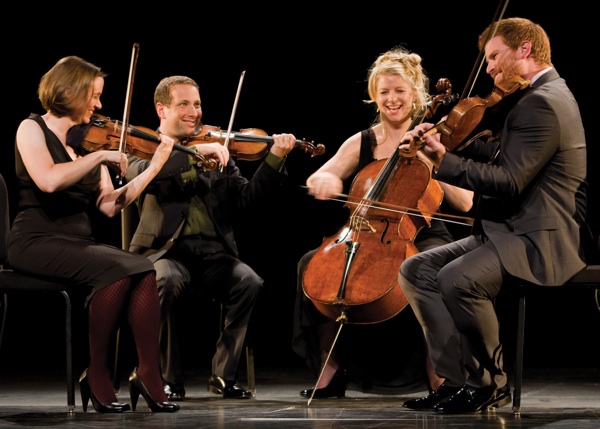When charm and wit ruled the world
Sitting in the ornate glory of the Julia Morgan-designed Berkeley City Club, what could possibly add to the charm of an earlier era? Most likely the sumptuous sounds of the Cypress Quartet performing Antonín Dvořák’s String Quartet in E-flat, Op. 51.
Joanne de Phillips, President of Berkeley Chamber Performances, welcomed them to the stage of the lovely second-floor theater, where Dvořák’s consummate craftsmanship would certainly have felt at home amid delicate concrete forms and carefully wrought beams. The Cypress Quartet took their name from Dvořák’s song cycle, The Cypress Trees, and it was obvious that they had cultivated a deep appreciation for this versatile composer.
But first they opened the conversation with an early Beethoven work, his String Quartet in D, Op. 18, No. 3. Violinist Cecily Ward took the mike beforehand to describe it.
“This morning we were at the Thornhill [Elementary] School and I told the third, fourth and fifth graders that the next piece was by Beethoven. There was an [indrawn gasp], as if that was the most exciting thing. And that is how we felt when we started in 1996. This early quartet really shows the influence of Mozart – lyrical, with flights of operatic fancy.”
She sat and began the work with a long note, and then the others joined in. It was pensive with clean lines. The vaulted hall propelled the lower frequencies out to us, but absorbed some of the highs, delivering a sound that was agile, if not entirely balanced. Their phrases were delicate as cat feet, mincing and hovering between apprehensive and witty. This was a restrained reading, showing us a young composer who stood in awe of the shades of Mozart and Haydn.
And then in the Andante they mined a richer accord. Ward closed her eyes to better feel the phrases, one pole of their dynamic. At the other end Jennifer Kloetzel embodied a force of Nature as she rumbled thick cello notes into being, often smiling upwards even as the others frowned in concentration. The cello was a ground that held and propelled their ensemble.
In the Allegro careful phrases were given full weight and a lovely motion, an exaggeration that let us hear Beethoven’s unexpected humor, but all done crisply. And then they galloped into the Presto.
“I think Mozart would have approved of what happened after him. This was written ten years after he passed away,” commented Kloetzel of Beethoven’s first quartet composition. Then she introduced the next piece. “In 1994 I was living in Prague and people were very excited about Schulhoff, but I didn’t know of him. Born in 1894, he was obviously precocious, and his mother took him to play for Dvořák, who gave him two pieces of chocolate and told his mother to get Schulhoff the best teachers she could. And she did.”
“When he was 19 he went to study with Debussy, whom he greatly admired for his experimental textures. But Debussy said, ‘You have to know the rules before you can break them,’ and set him to long exercises. He was disappointed and enlisted in the German army, where he spent the next three years! He wrote the Divertimento at the age of twenty while he was in the army, writing by night.”
 It was a little tongue in cheek, with tiny pizzicatos from the higher strings suspended above full cello strokes. Erwin Schulhoff was young in this, using simple arpeggios as his material, but he used them to good effect, adept and sarcastic and moody.
It was a little tongue in cheek, with tiny pizzicatos from the higher strings suspended above full cello strokes. Erwin Schulhoff was young in this, using simple arpeggios as his material, but he used them to good effect, adept and sarcastic and moody.
And then we settled in for that glorious interpretation of Dvořák’s glorious string quartet. Violinist Tom Stone took a turn at the mike. “The Dumka [second movement] has extreme emotions butted right up on top of each other. It is shocking. And then he builds chords one voice at a time, a nod to his awareness of the Beethoven quartets. No one is as masterful as Dvořák in the quartets.”
Overlapping entrances built and subsided into larger waveforms, with Ward lending a luscious close. And then the famed Dumka (Elegy), with Kloetzel strumming her cello like a guitar. Stone and violist Ethan Filner shone here, low and vibrant. It was dreamlike, with shapes flowing into each other.
The slow and sensuous Romanza, with descending fillips of notes like sighs, and then back to the Czech material and fast mood changes: serene and then tortured, playful and earnest, and a show-stopping fast finish.
As an encore they played another bit of Schulhoff, written late in his life, the Alla tango milonga movement from his Five Pieces for String Quartet, and it was a revelation: devious and intimate, the lines were lean and arrogant and then came together for strange alliances and long plump accords before diverging again. “Why would you ever play any other Schulhoff piece?” I later asked Ward. “Well, we’ve been playing that for a long time,” she answered, and one could infer that with long familiarity, they could hear the flower in the budding. And yes, there was a sarcastic element, and intimations of Baroque, just like the Divertimento, and even bits that could be folky, or Czech jazz.
While there are some things best said by the young, there is no substitute for charm and wit.
For their next concert, and finishing out this season, Berkeley Chamber Performances welcomes the Cook-Blankenburg Duo to the City Club on Tuesday, May 12 at 8:00 p.m. See their website for info: www.berkeleychamberperform.org.
—Adam Broner
Photo of the Cypress String Quartet, from left: Cecily Ward, Tom Stone, Jennifer Kloetzel, and Ethan Filner; photo by Basil Childers.
